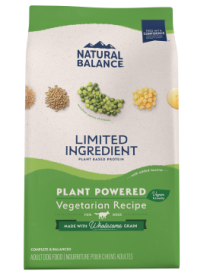
DogFoodAdvisor is reader supported See how
All reviews are 100% impartial but if you buy using links on this page, we may earn a referral fee.
The Natural Balance Vegetarian product line includes two dry dog foods.
Each recipe includes its AAFCO nutrient profile when available… Growth (puppy), Maintenance (adult), All Life Stages, Supplemental or Unspecified.
Please note: The recipes on this review are vegetarian foods so are currently unrated. This is because our review methodology favors dog foods rich in meat, and judging a plant-based diet against this criteria would always give a low rating. Studies of plant-based diets for dogs are showing some great results, as well as providing preferable options for many dogs with allergies or those wanting to choose more environmentally sustainable options.
| Product line | Rating | AAFCO |
|---|---|---|
| Natural Balance Limited Ingredient Vegetarian Small Breed Bites Recipe with Veg Broth Coating | Not rated | M |
| Natural Balance Limited Ingredient Vegetarian Recipe | No rated | M |
Recipe and Label Analysis
Natural Balance Limited Ingredient Vegetarian Recipe was selected to represent the other products in the line for a detailed recipe and nutrient analysis.
Natural Balance Vegetarian Formula
Estimated Dry Matter Nutrient Content
Protein
Fat
CarbsCarbohydrates
Brown rice, oat groats, barley, peas, potato protein, canola oil (preserved with mixed tocopherols), potatoes, dicalcium phosphate, dried tomato pomace, natural flavor, calcium carbonate, potassium chloride, choline chloride, taurine, minerals (zinc proteinate, zinc sulfate, ferrous sulfate, iron proteinate, copper sulfate, copper proteinate, manganese sulfate, manganese proteinate, calcium iodate, sodium selenite), salt, vitamins (vitamin E supplement, vitamin A supplement, d-calcium pantothenate, niacin, riboflavin supplement, vitamin D2 supplement, vitamin B12 supplement, thiamine mononitrate, pyridoxine hydrochloride, folic acid, biotin), flaxseed, dried spinach, parsley, cranberries, l-lysine monohydrochloride, l-carnitine, citric acid (used as a preservative), mixed tocopherols (used as a preservative), yucca schidigera extract, dried kelp, l-ascorbyl-2-polyphosphate (source of vitamin C), rosemary extract
Fiber (estimated dry matter content) = 5%
Red denotes any controversial items
| Estimated Nutrient Content | |||
|---|---|---|---|
| Method | Protein | Fat | Carbs |
| Guaranteed Analysis | 18% | 8% | NA |
| Dry Matter Basis | 20% | 9% | 63% |
| Calorie Weighted Basis | 19% | 21% | 60% |
Ingredients Analysis
The first ingredient in this dog food is brown rice, a complex carbohydrate that (once cooked) can be fairly easy to digest. However, aside from its natural energy content, rice is of only modest nutritional value to a dog.
The second ingredient includes oat groats, a whole grain, minimally processed form of oats. With the exception of their caloric content and the fact they’re also gluten free, oat groats can be considered average in nutritional value.
The third ingredient is barley, a starchy carbohydrate supplying fiber and other healthy nutrients. However, aside from its energy content, this cereal grain is of only modest nutritional value to a dog.
The next ingredient includes peas. Peas are a quality source of carbohydrates. And like all legumes, they’re rich in natural fiber.
The fifth item is potato protein, the dry residue remaining after removing the starchy part of a potato.
Even though it contains over 80% protein, this ingredient would be expected to have a lower biological value than meat.
The sixth ingredient is canola oil. Unfortunately, canola can be a controversial item. That’s because it can sometimes (but not always) be derived from genetically modified rapeseed.
Yet others cite the fact canola oil can be a significant source of essential omega-3 fatty acids.
In any case, plant-based oils like canola are less biologically available to a dog than fish oil as a source of quality omega-3 fats.
The seventh inclusion is potato. Potatoes can be considered a gluten-free source of digestible carbohydrates. Yet with the exception of perhaps their caloric content, potatoes are of only modest nutritional value to a dog.
The eighth ingredient is dicalcium phosphate, likely used here as a dietary calcium supplement.
The ninth ingredient is tomato pomace. Tomato pomace is a controversial ingredient, a by-product remaining after processing tomatoes into juice, soup and ketchup.
Many praise tomato pomace for its high fiber and nutrient content, while others scorn it as an inexpensive pet food filler.
Just the same, there’s probably not enough tomato pomace here to make much of a difference.
From here, the list goes on to include a number of other items.
But to be realistic, ingredients located this far down the list (other than nutritional supplements) are not likely to affect the overall rating of this Natural Balance product.
With four notable exceptions…
First, we find no mention of probiotics, friendly bacteria applied to the surface of the kibble after processing to help with digestion.
Next, we note the use of taurine, an important amino acid associated with the healthy function of heart muscle. Although taurine is not typically considered essential in canines, some dogs have been shown to be deficient in this critical nutrient and we view its presence in this recipe as a positive addition.
Additionally, we note the presence of sodium selenite, a controversial form of the mineral selenium. Sodium selenite appears to be nutritionally inferior to the more natural source of selenium found in selenium yeast.
And lastly, this food contains chelated minerals, minerals that have been chemically attached to protein. This makes them easier to absorb. Chelated minerals are usually found in better dog foods.
Nutrient Analysis
Natural Balance Vegetarian dog food is by design a meatless product.
So, although we do recognize the need for some dog owners to provide (for whatever reason) a completely meat-free diet, we also respect a dog’s natural carnivorous bias.
The dashboard displays a dry matter protein reading of 20%, a fat level of 9% and estimated carbohydrates of about 63%.
And a fat-to-protein ratio of about 44%.
Below-average protein. Below-average fat. And above-average carbs when compared to a typical dry dog food.
Natural Balance Dog Food Recall History
The following automated list (if present) includes all dog food recalls related to Natural Balance through March 2025.
You can view a complete list of all dog food recalls since 2009 here.
Our Rating of Natural Balance Dog Food
Natural Balance Vegetarian is a grain-inclusive dry dog food using a modest amount of potato protein as its dominant source of protein.
Compare Natural Balance Dog Food
How does Natural Balance compare with The Dog Food Advisor's most recommended brands?
A Final Word
The Dog Food Advisor does not accept money, gifts, samples or other incentives in exchange for special consideration in preparing our reviews.
However, we do receive a referral fee from online retailers (like Chewy or Amazon) and from sellers of perishable pet food when readers click over to their websites from ours. This helps cover the cost of operation of our free blog. Thanks for your support.
For more information, please visit our Disclaimer and Disclosure page.







